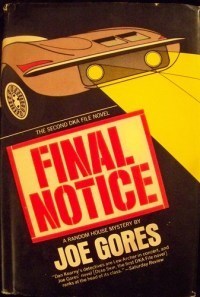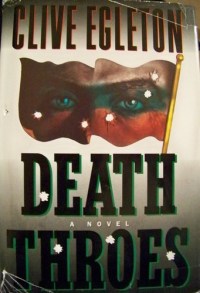Final Notice by Joe Gores
 Saturday, January 8, 2011 at 2:53PM
Saturday, January 8, 2011 at 2:53PM 
Published by Random House in 1973
Reading a DKA novel is like spending a few days shadowing a repo man to learn the ropes of the repossession business, except that it's more fun (and less dangerous). In a DKA novel, you know that you'll meet interesting characters, encounter plenty of action, and exercise your brain as you try to solve whatever puzzle Joe Gores has in store for you.
Final Notice takes place six months after Dead Skip. In that novel, Bart Heslip was hospitalized after being hit with a sap outside the DKA offices. Final Notice gets off to a similar start as Ed Dorsey is hospitalized after being beaten by two thugs outside the DKA offices. The beating seems to be tied to the repossession of a Cadillac belonging to an aging beauty named Chandra, whose delinquent payments are suddenly and mysteriously made good. Thanks to Heslip's intervention, one of the thugs who beat Dorsey is captured and identified as a mob henchman. DKA's founder, Dan Kearny, makes it his business to find out why Dorsey was beaten, and solves a couple of murders along the way.
The plot of Final Notice isn't quite as ingenious as that of Dead Skip, but it ties together nicely at the end. The pace is swift and the process of detection is fascinating. Characters come to life, particularly Giselle, a DKA employee whose ill-advised affair with a banker is a central focus of the story. Gores' prose is tight and suitably hard-boiled without becoming a parody. It's unfortunate this novel is out of print. Seek it out if you like first rate detective fiction.
RECOMMENDED
 TChris |
TChris |  Post a Comment |
Post a Comment | 



